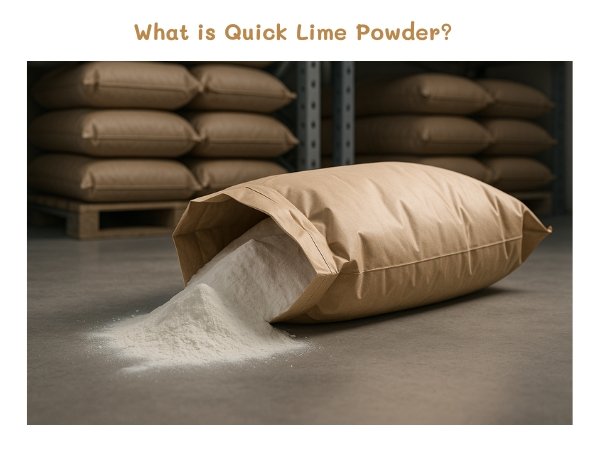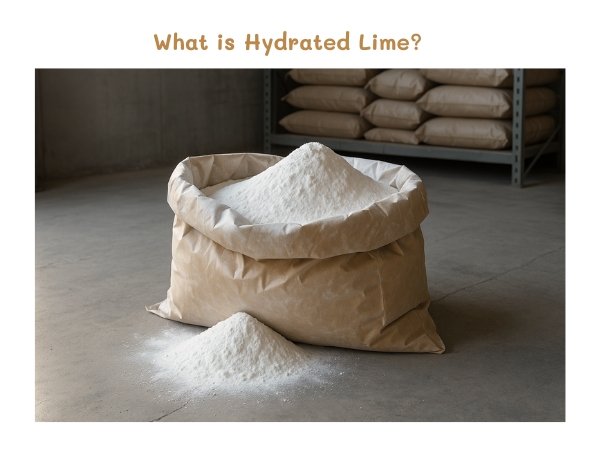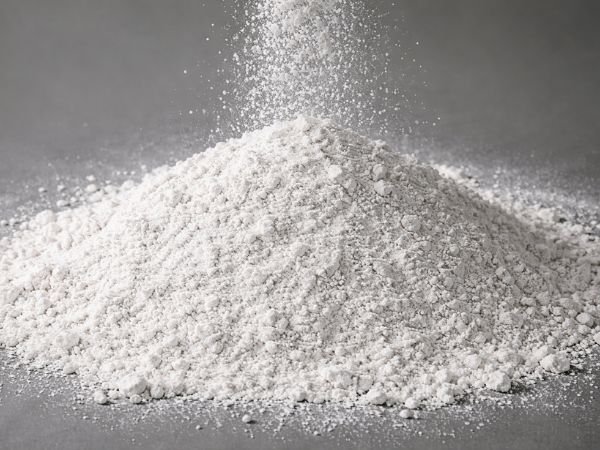Introduction
When choosing lime products for industrial or construction use, the question often arises Quick Lime Powder vs. Hydrated Lime: what’s the differences? Both materials play vital roles across industries in India, particularly in metallurgy, construction, chemical manufacturing, and agriculture. However, they are not interchangeable. Understanding their properties, usage, and how they differ helps buyers make informed choices especially for those sourcing from leading producers like Shri Jodhpur Lime, a trusted hydrated lime manufacturer in Rajasthan.
What is Quick Lime Powder?

Quick Lime Powder, also called Calcium Oxide (CaO), is obtained by heating limestone in kilns at high temperatures a process called calcination. This removes carbon dioxide (CO₂) from the stone, producing a highly reactive white or greyish powder.
Main Uses of Quick Lime Powder:
- Water treatment and pH correction
- Flue gas desulphurisation in power plants
- Steel manufacturing
- Sugar refining
- Soil stabilisation in road construction
Properties:
- Highly reactive when exposed to water
- Exothermic reaction on hydration
- Corrosive in nature
What is Hydrated Lime?

Hydrated Lime, also known as Calcium Hydroxide (Ca(OH)₂) or slaked lime, is produced by adding water to Quick Lime. This chemical reaction is called hydration, and it results in a safer, less reactive, and more manageable material.
Main Uses of Hydrated Lime:
- Sanitation and sewage treatment
- Mortar and plaster preparation
- Leather tanning
- Chemical and food-grade processing
- Flocculation in water treatment plants
Properties:
- Safer to handle than Quick Lime
- Stable in dry storage
- Mildly alkaline
Quick Lime Powder vs. Hydrated Lime: What’s the Differences?
Understanding the distinction between the two forms of lime is essential for choosing the correct product for a specific industrial process.
1. Chemical Composition and Process:
- Quick Lime is calcium oxide; Hydrated Lime is calcium hydroxide.
- Hydrated Lime is produced by mixing water with Quick Lime.
2. Reactivity:
- Quick Lime is more reactive and needs cautious handling.
- Hydrated Lime reacts mildly, making it suitable for applications needing controlled alkalinity.
3. Safety and Handling:
- Quick Lime can cause burns when in contact with water or skin.
- Hydrated Lime is relatively safer and preferred in populated or enclosed environments.
4. Storage Conditions:
- Quick Lime must be stored in moisture-free conditions.
- Hydrated Lime is easier to store and transport.
5. Usage Suitability:
- Quick Lime is used in high-temperature industrial processes.
- Hydrated Lime is used where safety, ease of application, and controlled reactions are necessary.
Benefits of Quick Lime Powder
Quick Lime Powder offers distinct advantages, particularly for industries that require high-temperature processing and immediate chemical reactivity. Its cost-effectiveness and efficiency in treating industrial waste and gases make it a preferred choice for many.
Key Benefits:
- High Reactivity: Reacts quickly with water and acids, making it effective in chemical processes.
- Cost-Effective Treatment: Used in flue gas desulphurisation, it helps reduce emissions affordably.
- Soil Stabilisation: Improves soil bearing capacity in road construction.
- Water Purification: Acts as a neutralising agent for acidic water in treatment plants.
- Industrial Flexibility: Widely used in steel, paper, sugar, and cement industries.
Benefits of Hydrated Lime
Hydrated Lime is valued for its safety, versatility, and ease of handling. Its controlled reactivity and alkaline nature make it useful across a wide range of applications, from sanitation to construction.
Key Benefits:
- Safe to Use: Milder than Quick Lime, making it suitable for populated areas and general handling.
- Versatile Applications: Common in whitewashing, food-grade processing, and effluent treatment.
- Reduces Odour: Neutralises sulphur compounds in waste treatment processes.
- Improves Construction Materials: Enhances durability and water resistance of plasters and mortars.
- Eco-Friendly Solution: Used in environmental applications like sludge treatment and acid neutralisation.
Which One Should You Use?
The decision between Quick Lime Powder and Hydrated Lime depends on:
Your Industry Needs:
- Steel Plants: Prefer Quick Lime for high-temperature processes.
- Water Treatment Units: Choose Hydrated Lime for its safer chemical behaviour.
- Construction Companies: Use Hydrated Lime for whitewashing and plaster.
Handling Capabilities:
- Do you have the equipment and training to manage reactive chemicals like Quick Lime?
- If not, Hydrated Lime offers better convenience.
Why Manufacturers Prefer Shri Jodhpur Lime
Among lime suppliers in India, Shri Jodhpur Lime has gained reputation for delivering consistent quality, bulk manufacturing, and timely delivery making it a preferred hydrated lime manufacturer in Rajasthan. Clients across Jodhpur, Gujarat, and beyond trust them for both Quick Lime Powder and Hydrated Lime in industrial grades.
Key Advantages of Choosing Shri Jodhpur Lime:
- High-grade limestone sourcing
- Advanced calcination and hydration plants
- Custom packaging and bulk logistics
- Technical consultation for industrial clients
Tips for Buyers in India: Choosing the Right Lime Product
If you are based in India and planning to source lime for industrial use, keep the following in mind:
1. Check Purity Levels:
Ensure your supplier provides a technical datasheet or purity certification.
2. Understand Moisture Sensitivity:
Quick Lime absorbs water quickly — always opt for waterproof packaging.
3. Ask for Samples:
Testing a small batch helps confirm reactivity, colour, and consistency.
4. Discuss Application Requirements:
Be clear whether you need fast reaction (Quick Lime) or mild alkalinity (Hydrated Lime).
Frequently Asked Questions
Q1. What is the main difference between Quick Lime and Hydrated Lime?
Answer: Quick Lime is calcium oxide that reacts violently with water, while Hydrated Lime is the product formed when Quick Lime is mixed with water.
Q2. Which lime is safer to handle?
Answer: Hydrated Lime is safer and easier to handle as it doesn’t react violently with moisture, unlike Quick Lime.
Q3. Can I use Quick Lime in place of Hydrated Lime?
Answer: Not always. Their reactivity and safety profiles differ, and using the wrong one can affect performance and safety.
Q4. Does Hydrated Lime expire?
Answer: While it doesn’t exactly expire, prolonged exposure to moisture reduces its effectiveness. Store in airtight, dry conditions.
Q5. Why is Rajasthan known for lime production?
Answer: Rajasthan has abundant high-quality limestone reserves, making it ideal for lime production. Towns like Jodhpur are key hubs for manufacturing and supply.
Q6. How do I store Quick Lime safely?
Answer: Keep it dry and airtight. Any exposure to moisture can trigger dangerous exothermic reactions.
Conclusion
Choosing between Quick Lime Powder vs. Hydrated Lime: what’s the differences is not just about knowing the chemistry. It’s about understanding safety, application, and sourcing quality. Whether you’re involved in construction, metallurgy, or chemical processing, selecting the right lime can impact results and compliance.
If you’re looking for a trusted hydrated lime manufacturer in Rajasthan, or need technical guidance on Quick Lime Powder, Shri Jodhpur Lime offers expertise, quality, and reliable support for your industrial lime needs.




